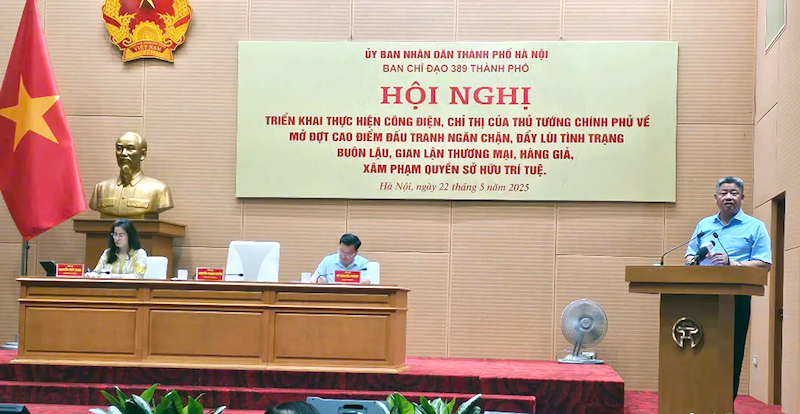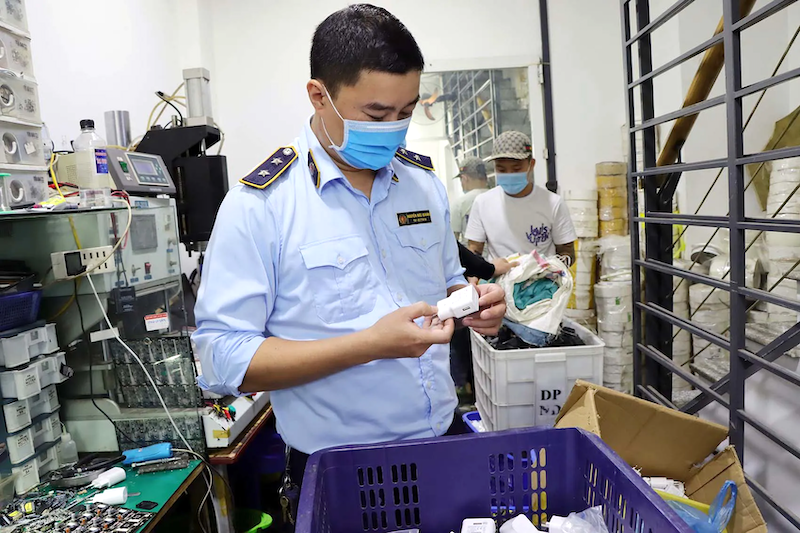Hanoi intensifies crackdown on smuggling and counterfeit goods
Hanoi is stepping up its crackdown on counterfeit and smuggled goods, holding local authorities directly accountable for violations found in their areas.
THE HANOI TIMES — Every local authority in Hanoi will be held responsible if counterfeit or smuggled goods are discovered in their area, as the city ramps up inspections and enforcement efforts across the capital.
Nguyen Manh Quyen, Vice Chairman of the Hanoi People’s Committee and Head of the city’s Steering Committee 389 (which combats trade fraud), issued the warning at a May 22 conference on implementing the Prime Minister’s urgent directives to combat smuggling, trade fraud, counterfeit products, and violations of intellectual property rights.

Nguyen Manh Quyen, Vice Chairman of the Hanoi People’s Committee and Head of the city’s Steering Committee 389, speaks at the conference on May 22. Photos: Hoai Nam/Kinh te & Do thi Newspaper
He stressed the importance of updating supervisory regulations and immediately issuing a detailed inspection plan targeting counterfeit and smuggled goods.
"Responsibilities must be assigned to each agency and individual. Inspections must focus on high-risk areas, such as e-commerce," he said, stressing interagency coordination for better enforcement.
In addition, it requires strengthening monitoring and preventing violations by publicizing hotlines and email addresses, and responding instantly to reports of smuggling and counterfeit activities.
Widespread violations trouble enforcement
According to Hanoi's Steering Committee 389, the illegal trade and distribution of smuggled goods, banned products, substandard items, and counterfeit goods, especially pharmaceuticals, food, cosmetics, and dietary supplements, remains complex and unpredictable.
So far this month, enforcement teams have conducted 493 inspections and found 444 cases, six of which were transferred to the investigative authorities. Administrative fines reached nearly VND5.9 billion (US$227,390), and the estimated value of seized illegal goods exceeded VND4.7 billion ($181,141).
In the same month, Hanoi police have uncovered a massive ring producing and trading fake dietary supplements, seizing over 100 tons of counterfeit goods, valued at more than VND77 billion ($2.9 million).
Managing the pharmaceutical and supplement market remains a major challenge due to regulatory loopholes. Hanoi police have cited systemic issues stemming from Decree 15/2018/ND-CP, which permits businesses to self-declare the safety and quality of their products without prior government verification. Although the decree aimed to streamline business processes, some firms have abused this mechanism for illegal practices.
Under the self-declaration policy, companies are not required to have their product dossiers evaluated by state agencies. The process is relatively simple and inexpensive, not involving regulatory fees. Consequently, many enterprises have flooded the market with products whose properties are falsely declared, creating a huge workload for post-market surveillance.
Trinh Quang Duc, Director of Hanoi’s Market Surveillance Department, said enforcement units are only authorized to inspect pharmaceuticals, traditional medicines, dietary supplements, and cosmetics that are already on the market and only when apparent violations are present.
He said that the oversight of nutritional supplements and functional foods, particularly those with specialized health benefits, falls under the Ministry of Health's jurisdiction.
Strengthened enforcement needed

Market surveillance forces in Hanoi busts a facility assembling fake Samsung phone chargers.
The Hanoi Customs Division Area 1 reports that customs officers will closely monitor high-risk areas and ensure strict inspections of imported and exported goods, personal luggage, and cross-border transportation.
The director of Hanoi’s Market Surveillance Department said enforcement teams have proactively identified high-risk routes, regions, individuals, and product groups while carrying out joint inspections to prevent cases.
At the same time, they have reinforced leadership accountability. "We are assigning direct responsibility to the heads of each unit and locality where major violations occur," Duc emphasized.
The department is also calling on e-commerce platforms and social media networks, such as Shopee, Lazada, TikTok, Facebook, and Zalo, to commit to stronger compliance measures. Authorities are urging these platforms to implement mechanisms that prevent the listing and sale of counterfeit, prohibited, or untraceable goods.
He said that to support the intensified crackdown, Hanoi’s special task force will define specific responsibilities for each enforcement agency and its supporting units.












